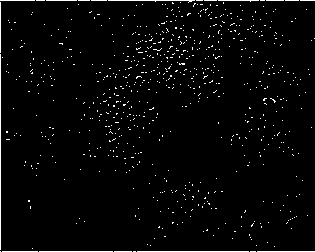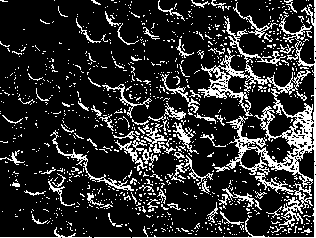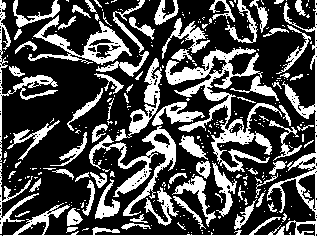A type of corneal epithelial cells, tissue engineering corneal epithelium, preparation and application
A technology of corneal epithelial cells and epithelial cells, applied in the field of tissue engineered corneal epithelium and its preparation and application, and corneal epithelial cells, which can solve the problem of the small number of adult stem cells, the difficulty of separating, differentiated and purified cell lines, and the lack of specific molecular markers, etc. problem, to achieve the effect of weakening western blot, reducing immune rejection, and convenient material collection
- Summary
- Abstract
- Description
- Claims
- Application Information
AI Technical Summary
Problems solved by technology
Method used
Image
Examples
Embodiment 1
[0058] (1) Isolation and expansion of sheep skin epidermal cells
[0059] ① Aseptically take the ear skin of Boer goats (raised in the test field), place it in normal saline containing penicillin, rinse with PBS containing penicillin, and remove blood stains and hair;
[0060] ②Separate the skin from the cartilage under a dissecting microscope, and cut the skin into 0.5×1cm 2 The skin slices of the same size were evenly placed in a glass petri dish, added with digestion solution containing 0.25wt% Dispase enzyme and 0.02wt% EDTA, overnight at 4°C, and the epidermis was separated the next day; In the EDTA digestion solution, treat at 37°C for 6 minutes, stop digestion with serum-containing medium (M199+15% fetal bovine serum), centrifuge to obtain cells, and use serum-free medium (F12+1.2%BSA+25ng / mL EGF+ 2.5μg / mL insulin + 10ng / mL IGF-1 + 0.4μg / mL hydrocortisone + 100U / mL penicillin + 100μg / mL streptomycin) to culture epidermal cells, when the cell proliferation reaches 75% c...
Embodiment 2
[0071] (1) Separation and expansion of skin epidermal cells
[0072] ① Aseptically take the ear skin of Boer goats (raised in the test field), place it in normal saline containing penicillin, rinse with PBS containing penicillin, and remove blood stains and hair;
[0073] ②Separate the skin from the cartilage under a dissecting microscope, and cut the skin into 0.3×0.8cm 2 The skin slices of the same size were evenly placed in a glass petri dish, added with digestion solution containing 0.25wt% Dispase enzyme and 0.02wt% EDTA, overnight at 4°C, and the epidermis was separated the next day; In the EDTA digestion solution, treat at 37°C for 5 minutes, stop digestion with serum-containing medium (M199+15% fetal bovine serum), centrifuge to obtain cells, and use serum-free medium (F12+1.0%BSA+20ng / mL EGF+ 2.5μg / mL insulin+15ng / mL IGF-1+0.6μg / mL hydrocortisone+100U / mL penicillin+100μg / mL streptomycin) to culture epidermal cells, when the cell proliferation reached 75% confluence, ...
Embodiment 3
[0084] (1) Separation and expansion of skin epidermal cells
[0085] ① Aseptically take the ear skin of Boer goats (raised in the test field), place it in normal saline containing penicillin, rinse with PBS containing penicillin, and remove blood stains and hair;
[0086] ②Separate the skin from the cartilage under a dissecting microscope, and cut the skin into 0.4×1.2cm 2 The skin slices of the same size were evenly placed in a glass petri dish, added with digestion solution containing 0.25wt% Dispase enzyme and 0.02wt% EDTA, overnight at 4°C, and the epidermis was separated the next day; In the EDTA digestion solution, treat at 37°C for 8 minutes, stop digestion with serum-containing medium (M199+15% fetal bovine serum), centrifuge to obtain cells, and use serum-free medium (F12+1.1%BSA+23ng / mL EGF+ 2.5μg / mL insulin+12ng / mL IGF-1+0.5μg / mL hydrocortisone+100U / mL penicillin+100μg / mL streptomycin) to culture epidermal cells, when the cell proliferation reached 75% confluence, ...
PUM
 Login to View More
Login to View More Abstract
Description
Claims
Application Information
 Login to View More
Login to View More - R&D
- Intellectual Property
- Life Sciences
- Materials
- Tech Scout
- Unparalleled Data Quality
- Higher Quality Content
- 60% Fewer Hallucinations
Browse by: Latest US Patents, China's latest patents, Technical Efficacy Thesaurus, Application Domain, Technology Topic, Popular Technical Reports.
© 2025 PatSnap. All rights reserved.Legal|Privacy policy|Modern Slavery Act Transparency Statement|Sitemap|About US| Contact US: help@patsnap.com



